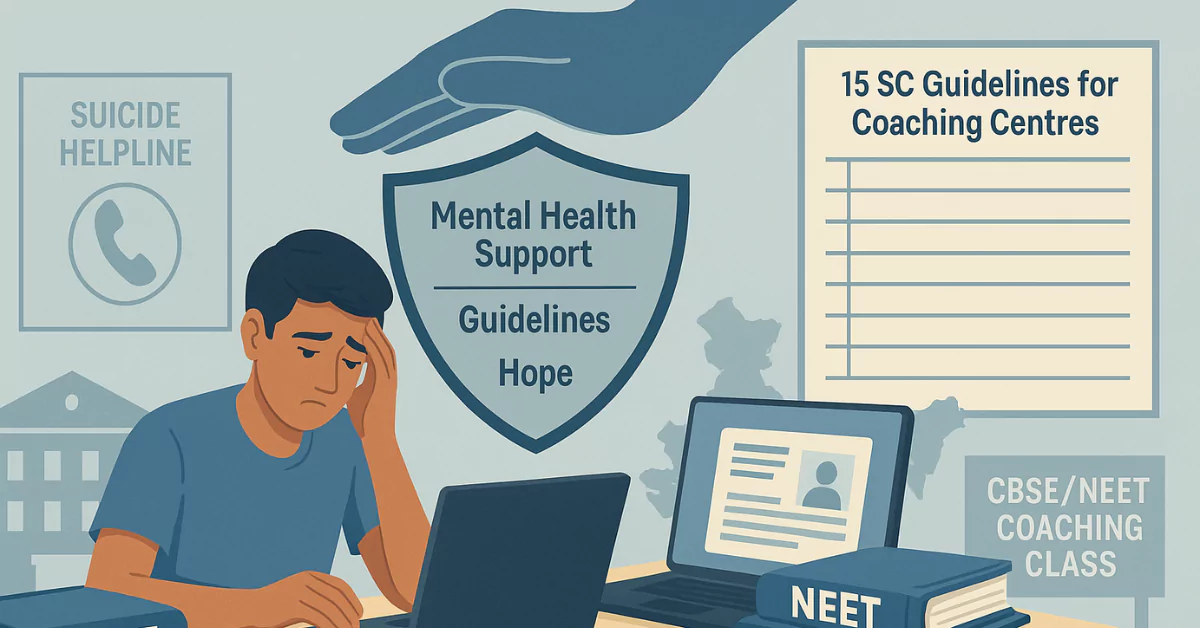New Delhi: The Supreme Court of India has issued strict guidelines to NEET coaching to prevent students’ suicide. SC intervention came over the rising number of student suicides, and it called the crisis a “systemic failure” that requires urgent action.
In a judgment delivered by Justices Vikram Nath and Sandeep Mehta, the court laid out 15 new binding guidelines for educational institutions nationwide. It aims to tackle the alarming trend and prevent further tragedies.
The bench issued these landmark guidelines while hearing a plea for a CBI probe into the suicide of a 17-year-old NEET aspirant in Vishakhapatnam, a case now officially transferred to the CBI for investigation.
Rising Numbers of Suicide Demand Urgency
The court’s intervention comes against a backdrop of grim statistics from the National Crime Records Bureau (NCRB).
In 2022 alone, India reported 13,044 student suicides, making up a significant portion of the country’s total 1,70,924 suicide deaths that year. The numbers have more than doubled since 2001, spotlighting an accelerating crisis.
Cities like Kota, Jaipur, Sikar, Vishakhapatnam, Hyderabad, and Delhi, hubs for competitive exam preparation, have been especially impacted.
What is Driving Students to Take Drastic Step?
The Supreme Court observed that “preventable causes” such as academic pressure, psychological distress, and a lack of compassionate institutional support were major contributors to these deaths.
It strongly criticised the absence of a unified national law or regulatory framework to provide mental health care and suicide prevention services in schools, colleges, and coaching centres.
15-point SC Guidelines for All Institutions
The new directives, enforceable until Parliament legislates on the matter, are set to overhaul student welfare policies in all educational settings:
Mandatory Mental Health Personnel
- All institutions with over 100 students must appoint at least one trained counsellor or psychologist.
- Smaller institutions must partner with external mental health experts.
Optimized Support
- Student-to-counsellor ratios must be improved.
- Dedicated mentors should guide small student groups, especially during exam seasons and academic transitions.
Crisis Response
- Institutions are required to set up written protocols for immediate referral to mental health services
- And must prominently display suicide helpline numbers, including Tele-MANAS.
Staff Training
- All staff must undergo training twice yearly in psychological first aid, identifying distress, and intervention strategies.
Focus on Marginalised Groups
- Regular engagement and sensitisation programmes must reach SC, ST, OBC, EWS, LGBTQ+ students, persons with disabilities, and those with trauma histories.
- Parent sensitisation sessions are now compulsory.
Ban on Harmful Practices
- Segregating students by academic performance, public shaming, and similar high-pressure tactics have been explicitly prohibited, especially in coaching centres.
Campus Safety
- Residential institutions must install safety features such as tamper-proof ceiling fans and restricted access to high-risk areas.
Confidential Records and Reporting
- Anonymous mental health records, annual wellness reports, and structured career counselling are to be instituted.
Comprehensive Orientation
- Student orientation must now include mental health and emotional regulation content.
Rights and Grievance Redressal
- Every campus must maintain safe, confidential avenues for reporting bullying, sexual harassment, ragging, and discrimination.
The court directed that institutional policies must integrate government-led mental health initiatives like “Ummeed” and “Manodarpan,” mandating annual policy reviews and updates.
To ensure the rapid and full implementation of its orders, the Supreme Court has asked the central government to submit a compliance affidavit within 90 days. Additionally, all states and union territories must announce binding rules for private coaching centres within two months.
The next hearing will be on October 27, closely monitoring institutional and governmental compliance with its sweeping directions.
These guidelines reflect a growing recognition that India’s academic environments must do more to protect young lives, shifting the focus from mere academic achievement to holistic student wellbeing.
The Supreme Court’s proactive stance marks a defining moment for student safety and mental health in India.

